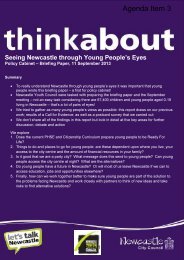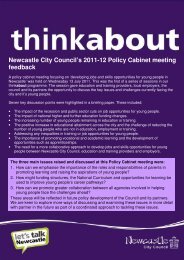NEWCASTLE'S MUSICAL HERITAGE AN INTRODUCTION By ...
NEWCASTLE'S MUSICAL HERITAGE AN INTRODUCTION By ...
NEWCASTLE'S MUSICAL HERITAGE AN INTRODUCTION By ...
Create successful ePaper yourself
Turn your PDF publications into a flip-book with our unique Google optimized e-Paper software.
‘Two other Englishmen who contributed substantially to the early popular<br />
music of America were James Hook (1746-1827) and William Shield (1748-<br />
1829). Their careers showed a curious parallel, not only in time but in the style<br />
and quality of their work.<br />
William Shield played both violin and viola, was a friend of Haydn in England<br />
and Master of the King’s Music (1817), rewarded by burial in Westminster Abbey.<br />
He has been credited (probably wrongly) with the tune of Auld Lang Syne, which<br />
appears with other borrowed melodies in his opera Rosina. But he was<br />
unquestionably the composer of The Green Mountain Farmer, for which Thomas<br />
(Robert) Paine wrote the words (1798). This was one of the most popular<br />
patriotic songs of its day.<br />
Other songs by William Shield to achieve success in America, as indicated by<br />
various pirated editions, were Johnny and Mary, The Streamlet, When Bidden to<br />
the Wake or Fair, My Friend and Pitcher and When First I Slipp’d My Leading<br />
Strings (all published here in 1789); The Cheering Rosary, A Smile from the Girl<br />
of My Heart and The Heaving of the Lead (1793); Ere Around the Huge Oak<br />
(1794); Old Towler (1796) Whilst with Village Maids I Stray and The Waving<br />
Willow (1797). The Wolf was a favourite in England, as were The Post Captain<br />
and The Thorn, published in America early in the nineteenth century (possibly<br />
even before 1800)’<br />
Spaeth goes on to say that Shield’s songs continued to be sung in America<br />
into the 1820s and 1830s.<br />
Another American writer, Julian Mates, who was more concerned with Shield’s<br />
stage works, wrote:<br />
‘Two of the elements necessary to a comic opera are original music and<br />
songs relevant to the action. As the eighteenth century progressed these<br />
elements were added, and “If we would look for sparks of brilliance (in the late<br />
eighteenth century) we must turn to the comic operas and the operatic farces….<br />
comic operas is not a development of ballad opera, but “in reality a separate form<br />
of dramatic art”<br />
Typical of the comic opera is John O’Keeffe and William Shield’s ‘The Poor<br />
Soldier’. It’s first performance in England was in 1783, and two years later it<br />
arrived in America, where not a year went by until after 1800 that the Old<br />
American Company alone did not perform it’<br />
Shield, who in later life was comfortably off, was unable or unwilling to change<br />
his style to a more modern one and following a dispute with the Covent Garden<br />
manager he retired in 1797, but he did continue composing glees and songs for<br />
use in the theatre. He also turned his talents to writing on theoretical matters,<br />
publishing two anthology-textbooks of music; ‘An Introduction to Harmony’<br />
(London 1800) and ‘The Rudiments of Thoroughbass’ (London 1815) which<br />
discuss such matters as how to harmonise folksongs. Shield composed music for<br />
popular approval not posterity. He is considered not to have been a natural<br />
20

















